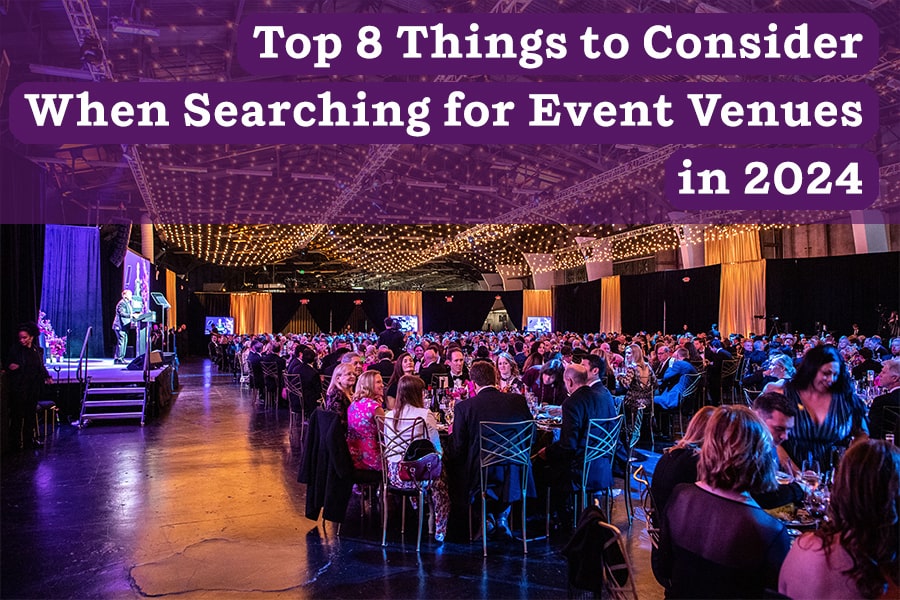Introduction
Choosing the right event venue is crucial to the overall success of an event. The location, atmosphere, and amenities can greatly impact the guest experience. So it’s important to think carefully when looking for event venues. This guide will show you eight of the most important things to think about when looking for event venues in 2024.
1. Location and Accessibility
Selecting the right location for an event venue plays a critical role in its success. When considering the location of an event venue, prioritize convenience for your attendees. This means choosing a location that has:
- Easy access to public transportation: Consider venues that are located near major bus or train stations, making it convenient for attendees to reach the event without relying solely on private transportation.
- Sufficient parking facilities: While public transportation is important, it’s also essential to consider attendees who may choose to drive to the event. Look for venues that provide ample parking spaces or have partnerships with nearby parking garages.
- Proximity to hotels for out-of-town guests: If your event has attendees coming from out of town, it’s crucial to choose a venue that is conveniently located near hotels or accommodation options.
2. Space Requirements and Versatility
When it comes to organizing an event, two important things to consider are the space requirements and the venue capacity. These factors play a crucial role in determining whether a venue is suitable for your event or not.
Understanding the Needs of Your Event
The space requirements can vary greatly depending on the type of event you’re planning. To understand the needs of your event, ask yourself the following questions:
- How many people are expected to attend?
- What kind of activities will take place during the event?
- Are there any specific technical requirements (e.g., stage, lighting, sound system)?
By answering these questions, you’ll be able to determine the space requirements more accurately.
Evaluating Venue’s Space Versatility
Another important aspect to consider is the venue’s space versatility. This refers to how easily the space can be customized to fit different event themes and setups.
Here are some tips for evaluating a venue’s versatility:
- Assessing layout options: Look for venues that offer multiple layout options, including both large gathering areas and smaller breakout rooms.
- Checking existing infrastructure: Find out if the venue has any built-in staging, lighting systems, or other amenities that could enhance your event. If not, is that something that they can assist with putting together?
- Considering customization restrictions: Some venues may have certain restrictions on what you can do with the space (e.g., no hanging decorations, must use their ). Make sure to ask about these beforehand.
By finding the right balance between space requirements and versatility, you can create an event that is both functional and memorable.
3. Insurance and Liability
One cannot ignore the importance of event insurance and understanding venue liability when securing an event venue. It is important to understand the insurance coverage requirements specific to each venue. Some venues may require a special event insurance policy or ask to be added as an additional insured on your policy. Learn about these requirements early in the planning process to avoid any unexpected issues.
Understanding Insurance Coverage Requirements
Familiarize yourself with the following insurance coverage requirements:
- General Liability Insurance: This type of insurance protects against claims of property damage or bodily injury that may occur during the event. Many venues require a minimum amount of general liability insurance coverage.
- Liquor Liability Insurance: If you plan to serve alcohol at your event, you may need liquor liability insurance to protect against claims related to alcohol-related accidents or incidents.
- Workers’ Compensation Insurance: If you hire staff or volunteers for your event, you may be required to provide workers’ compensation insurance to cover any work-related injuries they may sustain.
Make sure to review your existing insurance policies (such as homeowner’s or business insurance) to see if they provide any coverage for events. If not, consider purchasing a separate event insurance policy that meets the venue’s requirements.
Understanding Venue Liability
Venue liability refers to the legal responsibility of the venue owner or operator for any accidents or injuries that occur on their property during an event. It is important to understand:
- Who is responsible for maintaining the property and ensuring it is safe for use
- Any limitations on the venue’s liability, such as waivers or indemnification clauses
- What steps the venue has taken to mitigate potential risks and ensure guest safety
4. Acoustics
The sound quality at an event can greatly impact the overall experience.
This is why it’s important to consider the acoustics of the venue. Here are some technical aspects to keep in mind:
Factors to Consider
- Sound Reverberation: Check how long it takes for sound to fade away in the venue. Spaces with high ceilings or hard surfaces may cause sound to bounce around, leading to echoes or unclear audio.
- Background Noise: Look out for any potential sources of noise interference, such as traffic or air conditioning systems. These can make it difficult for people to hear speeches or performances clearly.
- Soundproofing: Find out how well sound is blocked between different areas within the venue. This is especially important if there will be multiple events happening at the same time.
Understanding Different Sound Needs
Each type of event has its own unique sound requirements:
- For concerts or performances, the main focus is on having clear and rich sound.
- Conferences prioritize speech clarity and minimizing echo for effective communication.
- Social gatherings usually call for a mix of background music and the ability for people to chat comfortably.
By taking these technical factors into consideration, event organizers can choose venues that best suit their audio needs and create a more engaging experience for attendees.
5. Ambiance
The ambiance of a venue is crucial in setting the mood for any event. It acts as a subtle yet powerful backdrop that can either enhance or diminish the overall experience. Here are some factors to consider when assessing a venue’s ambiance:
Factors to Consider for Venue Ambiance
- Lighting: Take note of the natural light available and the type of lighting fixtures in place. Can the lighting be adjusted to create different atmospheres?
- Architecture and Decor: Does the architectural style of the venue match your event theme? Are there any unique decor elements that resonate with your brand? Bonus if the venue willing to work with you on further customizing the ambiance to fit your needs.
- Furnishings: Pay attention to the style and comfort of the furniture provided. Will they facilitate interaction and engagement among attendees? Is the venue flexible on bringing in outside furnishings that will better suit your event?
By carefully considering the venue’s ambiance and making strategic decor choices, you can create an immersive environment that truly represents your brand and captivates attendees.
6. Food and Beverage Minimums
When it comes to event planning, there’s one important aspect that often gets overlooked: food and beverage minimums set by the venue. These minimums can have a significant impact on your event budget, so it’s crucial to understand them before making any decisions.
What Are Food and Beverage Minimums?
Food and beverage minimums are the minimum amounts that you must spend on food and drinks at a particular venue. They are usually set by the venue as a way to ensure that they make a certain amount of revenue from each event.
How to Manage Food and Beverage Minimums
Here are some tips to help you manage food and beverage minimums effectively:
- Research Different Venues: Different venues have different policies regarding these minimums. Some may offer flexibility, which can be beneficial if you have specific budget constraints. Be sure to ask about this during your initial discussions.
- Understand Inclusions: Clarify whether the stated minimums include service charges and taxes. Hidden costs can quickly inflate your event budget, so it’s best to get this information upfront.
- Plan Ahead for Additional Costs: It’s advisable to research any other potential costs related to food and beverage at the venue. This could include corkage fees if you’re bringing in outside alcohol or additional charges for special dietary requests.
By being proactive and addressing these points early on in your venue selection process, you can avoid surprises down the line and ensure that the venue fits within your overall event budget.
7. Permitting Requirements
Often over-looked, acquiring the proper permits for your event is often a critical step in the planning process. Ensuring your event operates within legal parameters avoids complications that can arise from non-compliance. Here are key considerations regarding permits:
Assess Event-Specific Permit Needs
Different events have unique permit requirements. A music festival might need sound permits, while a food expo could require health department clearances. Thoroughly understanding these needs helps streamline venue selection.
Verify Venue Permits
Engage with prospective venues to confirm they possess the necessary permits for your event type. This proactive approach helps mitigate risk and ensures events proceed without regulatory hiccups.
Local Regulations and Zoning Compliance
Familiarize yourself with local ordinances that may affect your event. Whether it’s zoning laws or time restrictions, compliance with local regulations ensures the venue is an appropriate choice for your event.
By meticulously examining these factors, you confidently navigate the permitting landscape, ensuring that your selected venue aligns seamlessly with both your event’s needs and legal requirements.
If you are lucky, the venue Team may be able to help you in securing all of the necessary permitting for your event. It never hurts to ask! (Hint: Non Plus Ultra can help with this!)
8. Budget Considerations
Being one of the more important factors, it’s important to prioritize the venue budget to make sure money is used wisely. A good venue budget is vital to the overall event plan, balancing quality and cost without sacrificing other important parts of the event.
Here are some tips for managing your venue budget effectively:
- List all expenses: Start by breaking down expected costs into two categories: venue-related expenses and costs for other parts of the event like entertainment, marketing, and attendee arrangements.
- Watch out for extra charges: Check if there are any hidden fees or mandatory add-ons that could increase costs beyond the initial quote.
- Negotiate where possible: Consider talking to venue managers about special deals or discounts, especially if you have a large number of attendees or multiple dates booked.
- Plan for the unforeseen: Try to leave a little wiggle room in your budget just in case any additional expenses crop up during the planning or execution stages.
By managing your budget well, you can find a venue that not only meets your needs but also helps make your event financially successful without putting too much strain on resources.
Conclusion
As an event organizer, the search for the perfect venue in 2024 must be holistic, meticulous, and adaptable. The right choice can set the tone for a successful event, impacting every aspect from attendance to attendee experience.
Remember: thorough planning paired with diligent research can make all the difference between an average event and one that is truly unforgettable. Stay proactive, stay informed, and stay ahead with your venue selection process in 2024. At the end of the day, trust your gut instinct after visiting each potential venue and speaking with their Management Team – it’s important to feel a connection to the space and envision your event coming to life there. We are confident that you will find that connection with the Non Plus Ultra Team, and our wide selection of truly unique venues.
Ready to start your venue selection process? Browse Non Plus Ultra’s impressive list of venues today!

